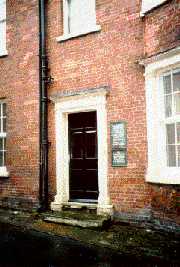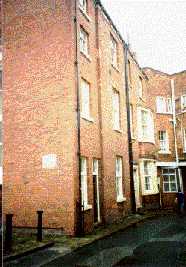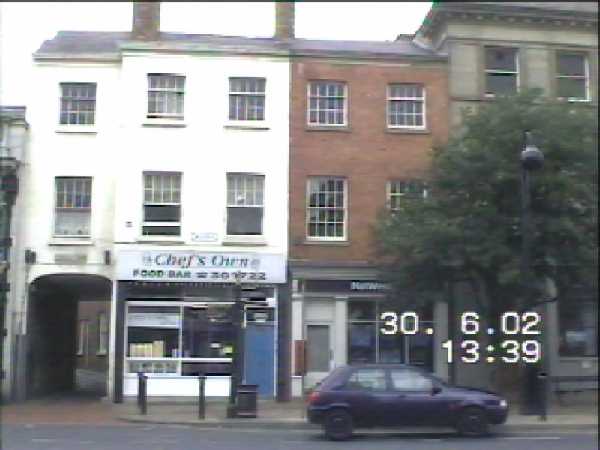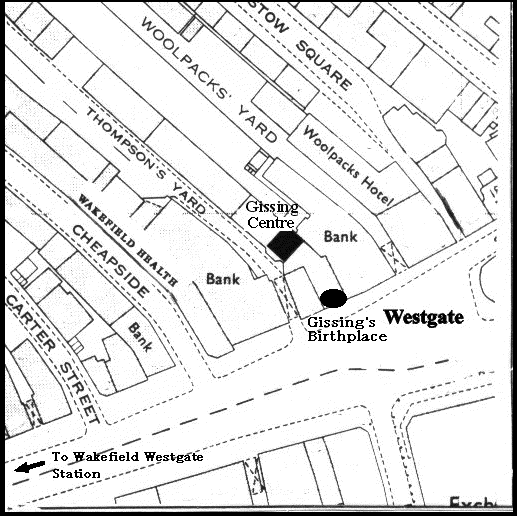The Gissing Trust was founded in 1978 by Wakefield Civic Society,
Wakefield Historical Society, international
scholars and others, linked by The Gissing
Journal, to further the establishment of the
Gissing Centre, the preservation of properties
associated with George Gissing, the acquisition
care and display of objects connected with
George Gissing and the literary history of
Wakefield, and the pursuit of research relating to
George Gissing and the literary history of
Wakefield.
The Gissing Journal, a quarterly publication devoted to the life and work of George Gissing, is edited and published by Markus Neacey, Berlin.
Group visits, and talks on a variety of topics
relating to the literary history of Wakefield, can
be arranged by contacting the Hon. Secretary,
Dr. Philip Edward Judkins, PhD, MA (Cantab), MSc.,
18 St. John's Square, Wakefield WF1 2RA. Tel: 0797 144 9451.
Donations to assist in the maintenance of the
Centre and to further the work of the Trust will
be gratefully received.
The Gissing Centre has been established with
assistance from The National Westminster Bank.
VISIT THE GISSING CENTRE


THIS TABLET WAS ERECTED TO COMMEMORATE THE BIRTHPLACE OF
GEORGE GISSING (1857-1903)
NOVELIST AND MAN OF LETTERS
THE GISSING CENTRE
OPEN EVERY SATURDAY
MAY - SEPTEMBER
2:00 p.m. - 4:00 p.m.
OR BY APPOINTMENT
with the Hon. Secretary
Dr. Philip Edward Judkins.
The Centre can be opened at other times if arrangements
are made with the Hon. Secretary.
Thompson's Yard, Westgate, Wakefield, West Yorkshire WF1 2TP.
Wakefield childhood home of novelist GEORGE GISSING
Family Memorabilia and Exhibition Material
about George Gissing and a model of
the family home.
Videos giving an insight into his life and his
Wakefield Novel "A Life's Morning".
Books by and about George Gissing.
Open Saturdays May to September
2.00 pm - 4.00 pm
ADMISSION FREE
Gissing's novels are a protest against the form of self-torture that goes by the name of respectability. Gissing was a bookish, over-civilised man, in love with classical antiquity, who found himself trapped in a cold, smoky, Protestant country where it was impossible to be comfortable without a thick padding of money between yourself and the outer world. Behind his rage and querulousness there lay a perception that the horrors of life in late-Victorian England were largely unnecessary. The grime, the stupidity, the ugliness, the sex-starvation, the furtive debauchery, the vulgarity, the bad manners, the censoriousness - these things were unnecessary, since the puritanism of which they were a relic no longer upheld the structure of society. (George Orwell, George Gissing)
He seems to me above all a case of saturation, and it is mainly his saturation that makes him interesting - I mean especially in the sense of making him singular. The interest would be greater were his art more complete; but we must take what we can get, and Mr Gissing has a way of his own. The great thing is that his saturation is with elements that, presented to us in comtemporary English fiction, affect us as a product of extraordianry oddity and rarity: he reeks with the savour, he is bowed beneath the fruits, of contact with the lower, with the lowest middle-class, and that is sufficient to make him an authority - the authority in fact - on a region vast and unexplored. (Henry James, Harper's Weekly, 31 Julu 1897)
Gissing's Birthplace
Thompson's Yard [1] / Thompson's Yard [2]
The photo of no 60 Westgate - the fast food shop next to the Thompsons
Yard coaching tunnel is no 62, the small National Westminster branch next door is no 60 and
the main Nat' West behind the tree is no's 58/56. Courtesy of Mr. Josh Johnson, Wakefield Karate College, Thompson's Yard.

Gissing's Birthplace Neighbourhood Map
Provided by Josh Johnson.

Back to Gissing in Cyberspace.
 Top of Page
Top of Page
 Mitsuharu Matsuoka's Home Page
Mitsuharu Matsuoka's Home Page




 Top of Page
Top of Page Mitsuharu Matsuoka's Home Page
Mitsuharu Matsuoka's Home Page